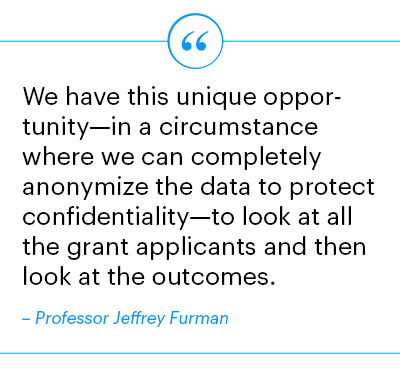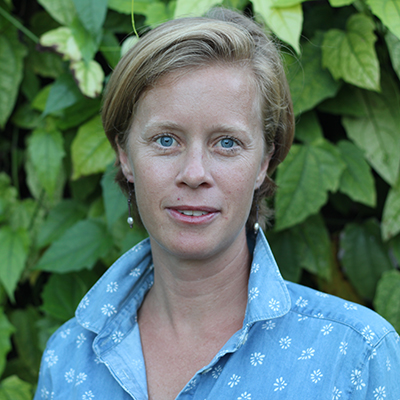BU Law Professors Plan to Study Impact of Biopharmaceutical Funder CARB-X
Professors Michael Meurer and James Bessen join interdisciplinary team examining data from BU Law-based accelerator.
 Three Boston University School of Law professors are part of an interdisciplinary team of researchers gearing up to study how drug development companies benefit from funding and assistance provided by CARB-X, a biopharmaceutical accelerator housed at BU Law.
Three Boston University School of Law professors are part of an interdisciplinary team of researchers gearing up to study how drug development companies benefit from funding and assistance provided by CARB-X, a biopharmaceutical accelerator housed at BU Law.
Professors Michael J. Meurer and James Bessen are joining forces with Questrom School of Business Professors Jeffrey Furman, Iain Cockburn, and Megan MacGarvie to examine CARB-X data to determine how the program impacts companies’ performance. CARB-X was formed in 2016 when the US Department of Health and Human Services selected BU Law—and Professor Kevin Outterson—to head up a public-private partnership designed to advance development of new antibiotics, antimicrobial rapid diagnostics, and vaccines to combat antibiotic-resistant bacteria. The project so far has received more than $500 million in public and private funds; it began distributing grants in the spring of 2017. More than 30 companies currently have CARB-X funding.
Working with a fellow provided by the Social Innovation on Drug Resistance (SIDR) Postdoctoral Program, the team hopes to analyze—using confidential data from grantees and grant applicants—what impact CARB-X funding has on drug development.
“We’re going to use econometrics to investigate what advantage is derived by researchers that get CARB-X funding,” says Meurer. “If the groups that get funded show a benefit, then it seems reasonable to suppose the CARB-X funding is what pushed them along. We want to look at outcomes such as, did this group find a treatment for infections that was successful, did they get patents, did they get venture capital funding.”
The team is well-equipped for the challenge. All of the professors involved have a background in economics; Meurer and Bessen also head up the Technology & Policy Research Initiative at BU Law, which focuses on the effects of new technology on the workforce, intellectual property policies that can encourage innovation, and how the government influences economic dynamism.
 The still-evolving research also builds on BU Law’s previous work, including in the field of personalized medicine. In 2015, the Journal of Science & Technology Law, under the guidance of Meurer, held a symposium and published a special issue on personalized medicine.
The still-evolving research also builds on BU Law’s previous work, including in the field of personalized medicine. In 2015, the Journal of Science & Technology Law, under the guidance of Meurer, held a symposium and published a special issue on personalized medicine.
“We have a lot of strengths in health law, patent law, IP law,” Meurer says. “It’s natural for BU Law to be interested in questions like this.”
To help provide answers, CARB-X is offering a rare, behind-the-scenes look at grantmaking. Most funders are happy to share data about successful grantees but reluctant to hand over information about applicants who did not receive funding.
“We have this unique opportunity—in a circumstance where we can completely anonymize the data to protect confidentiality—to look at all the grant applicants and then look at the outcomes,” says Furman.
To solve for the so-called “selection problem” (the idea that grant recipients perform well precisely because they had better proposals to begin with), the team will discard applicants with the highest and lowest scores from the CARB-X evaluators. That way, only unsuccessful applicants and grantees with very similar scores will be compared.
The research will serve two purposes: It will allow CARB-X to reflect on its own efficacy, and it will advance the study of grantmaking more generally. Outterson, who serves as executive director of CARB-X and director of SIDR, says that was part of his vision from the start.
“We want to solve the problem of drug-resistant bacteria, and we also know there are many things we don’t understand about how science progresses and how grants function,” he says. “We have a huge grant-making system in the world but not much published literature on how it could be better.”
At CARB-X, he continues, the idea is to “turn a self-critical eye on our own processes and evaluate whether we’re doing a good job or a bad job. What’s most likely is that we can improve.”
That information is crucial for CARB-X as a funder, and for CARB-X’s funders, which include the Biomedical Advanced Research and Development Authority, an entity within HHS; the National Institute of Allergy and Infectious Diseases, part of the US National Institutes of Health; the Wellcome Trust, a global charitable foundation in London; the Bill & Melinda Gates Foundation; and the Global Antimicrobial Resistance Innovation Fund, an initiative of the United Kingdom government.
Depending on the postdoc’s interests and availability, the team hopes to study other questions as well, including which types of evaluation by funders such as CARB-X best predict novelty and commercial success; and, in light of recent US Supreme Court decisions limiting the patentability of some treatments and medicines, which patenting strategies are most effective for biopharmaceutical ventures seeking to raise funds.
The questions are worth asking, Meurer says, because resources for biomedical research are not infinite.
“It’s very important to figure out how to pick winners—given a biomedical research budget, what’s the most efficient way to spend that budget,” he says. “There’s a lot of economic evidence that the social payoff to medical R&D is really high. If we can improve the way we spend money, the returns could be quite large.”
Reported by Rebecca Beyer
Related News
- BU-Based CARB-X Antimicrobial Partnership Gets Another $50 Million Plus
- BU Law Professor Examines Federalism in Affordable Care Act
- Intellectual Property Scholars Examine Competition Policy, History of Patents
